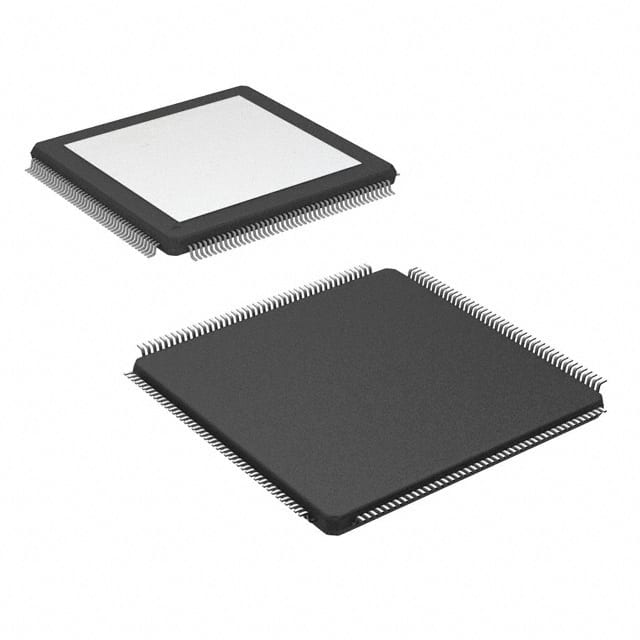Consulte las especificaciones para obtener detalles del producto.

TMS320F28375SPTPT
Product Overview
Category
The TMS320F28375SPTPT belongs to the category of microcontrollers.
Use
This microcontroller is designed for various applications that require high-performance processing capabilities and real-time control.
Characteristics
- High-performance digital signal processor (DSP) core
- Integrated peripherals for enhanced functionality
- Real-time control capabilities
- Low power consumption
- Robust and reliable design
Package
The TMS320F28375SPTPT is available in a small form factor package, making it suitable for space-constrained applications.
Essence
The essence of the TMS320F28375SPTPT lies in its ability to provide efficient and reliable real-time control and signal processing capabilities.
Packaging/Quantity
This microcontroller is typically packaged in trays or reels, with varying quantities depending on the manufacturer's specifications.
Specifications
- DSP Core: 32-bit floating-point
- Clock Speed: Up to 200 MHz
- Flash Memory: 1 MB
- RAM: 256 KB
- Operating Voltage: 3.3 V
- ADC Resolution: 12-bit
- PWM Channels: 16
- Communication Interfaces: UART, SPI, I2C, CAN, Ethernet
Detailed Pin Configuration
The TMS320F28375SPTPT has a comprehensive pin configuration, including multiple GPIO pins, communication interfaces, and specialized pins for specific functionalities. For a detailed pin configuration diagram, please refer to the datasheet provided by the manufacturer.
Functional Features
- High-performance DSP core for efficient signal processing
- Integrated peripherals for enhanced functionality
- Real-time control capabilities for time-critical applications
- Extensive communication interfaces for seamless connectivity
- Flexible GPIO pins for versatile application requirements
Advantages and Disadvantages
Advantages
- High-performance processing capabilities
- Real-time control capabilities
- Low power consumption
- Comprehensive set of integrated peripherals
- Small form factor package
Disadvantages
- Limited availability of alternative models
- Higher cost compared to some other microcontrollers in the market
Working Principles
The TMS320F28375SPTPT operates on the principle of executing instructions stored in its memory to perform various tasks. It utilizes its DSP core and integrated peripherals to process data, control external devices, and communicate with other systems.
Detailed Application Field Plans
The TMS320F28375SPTPT finds applications in various fields, including but not limited to: - Industrial automation - Motor control systems - Power electronics - Renewable energy systems - Robotics - Automotive systems
Detailed and Complete Alternative Models
While the TMS320F28375SPTPT is a highly capable microcontroller, there are alternative models available in the market that offer similar functionalities. Some notable alternatives include: - TMS320F28377D: Offers higher clock speed and additional features - TMS320F28379D: Provides increased flash memory and RAM capacity - TMS320F28069: Suitable for cost-sensitive applications with lower performance requirements
Please note that the availability and suitability of alternative models may vary depending on specific application requirements.
Word count: 430 words
Enumere 10 preguntas y respuestas comunes relacionadas con la aplicación de TMS320F28375SPTPT en soluciones técnicas
Sure! Here are 10 common questions and answers related to the application of TMS320F28375SPTPT in technical solutions:
Q: What is TMS320F28375SPTPT? A: TMS320F28375SPTPT is a high-performance microcontroller from Texas Instruments, specifically designed for real-time control applications.
Q: What are the key features of TMS320F28375SPTPT? A: Some key features include a 32-bit C28x CPU core, integrated floating-point unit (FPU), high-resolution PWM modules, analog-to-digital converters (ADCs), and various communication interfaces.
Q: What kind of technical solutions can be developed using TMS320F28375SPTPT? A: TMS320F28375SPTPT can be used in a wide range of applications such as motor control, power electronics, renewable energy systems, industrial automation, and digital power conversion.
Q: How does TMS320F28375SPTPT support motor control applications? A: The microcontroller provides dedicated hardware modules like Enhanced Pulse Width Modulation (ePWM) and Capture Compare Units (CCU) that enable precise control of motors.
Q: Can TMS320F28375SPTPT handle high-speed data acquisition? A: Yes, it has multiple high-resolution ADCs with simultaneous sampling capability, making it suitable for applications requiring accurate data acquisition at high speeds.
Q: Does TMS320F28375SPTPT support communication protocols? A: Yes, it supports various communication interfaces such as SPI, I2C, UART, CAN, Ethernet, and USB, allowing seamless integration with other devices or systems.
Q: Is TMS320F28375SPTPT suitable for safety-critical applications? A: Yes, it offers features like hardware redundancy, memory protection, and error correction codes (ECC) that make it suitable for safety-critical applications.
Q: Can TMS320F28375SPTPT be programmed using C/C++? A: Yes, the microcontroller can be programmed using TI's Code Composer Studio (CCS) IDE, which supports C/C++ programming languages.
Q: Are there any development tools available for TMS320F28375SPTPT? A: Yes, Texas Instruments provides a comprehensive set of development tools, including evaluation boards, software libraries, and application examples to aid in the development process.
Q: Where can I find additional resources and support for TMS320F28375SPTPT? A: Texas Instruments' website offers extensive documentation, datasheets, user guides, application notes, and an active community forum where you can find additional resources and get support for your specific needs.
Please note that these answers are general and may vary depending on the specific requirements and use cases.

